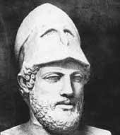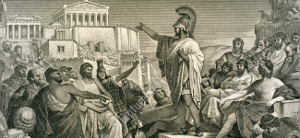Pericles: Famed General-Statesman of Ancient Greece
One of the most influential men in the history of Ancient Greece was Pericles, the general-statesman who led Athens for a handful of decades, through the building of an empire and into a disastrous war with Sparta. His sway over Athens was such that the famed historian Thucydides named him "the first citizen of Athens." 
He was born in 495 B.C. into a wealthy family steeped in political tradition. His father, Xanthippus, was a politician and war hero; his mother, Agariste, was a niece of the famed reformer Cleisthenes. The young Pericles studied music and philosophy and learned form the well-known philosopher Anaxagoras. Pericles became known as a political leader and a champion of populist causes. One of his proposals was for the government to pay the cost of attending a play if anyone was too poor to afford the fee; another was to give members of the lower classes access to public offices, which had traditionally been held by members of the upper classes. About the same time, the Assembly diminished the powers of the Areopagus; championing this measure was Ephialtes, Pericles' mentor. The leader of the conservative faction at this time was a man named Cimon, who had been unable to check the growing dominance of Philip II of Macedon. Cimon had made a habit, as had many before him, of handing out political positions to friends and solidifying his position by giving gifts. In 461 B.C., Cimon was ostracized, after facing accusations that he had conspired with Sparta against Athens; he was exiled for a decade. In the same year, Ephialtes was killed, possibly in revenge for his attacks on the wealthy. With Cimon's exit and Ephialtes' death, Pericles reigned supreme in Athens. Also thriving in Athens during this time were many of Ancient Greece's most famous names: playwrights Aeschylus, Sophocles, Euripedes, and Aristophanes; medical pioneer Hippocrates; famous sculptors Phidias (Athena Parthenos) and Myron (Discus Thrower); the great philosopher Socrates. The Acropolis and the Parthenon were built during this time. And yet, the influence of "the first citizen" was so great that this period was called the Age of Pericles. Pericles went to work consolidating Athens' position within the wider Greek world. War with Sparta flared in the First Peloponnesian War, in the 450s. Athens also tried to assist an Egyptian revolt against Persia, but Persia emerged victorious; Athens and Persia found peace terms not long after that. Cimon returned from exile and led the Athenian army, in one case to victory over Persia. Just two years after he returned, however, he died of illness. A peace between Athens and Sparta took hold in 446 B.C.; it was intended to last 30 years. By this time, Pericles and Athens were in full command of the Delian League, an organization designed to counter the resurgent Persian influence in the Mediterranean. The League had begun as a mutual defense project with shared resources but had morphed into a monetary generation system for Athens; at one point, Athens took the entirety of the Delian League treasury and spent it on rebuilding in Athens. This angered not only Athens' allies but more pointedly Athens' enemies; Sparta, in particular, took issue, seeing a need to counter the wide influence of what by this point was the Athenian Empire. The Peloponnesian War began in 431 B.C. One of Pericles' first actions was to convince everyone living in Attica, the area surrounding Athens, to move within the great walls of the city, as part of an overall strategy to achieve victory by exhausting and outlasting the opponent. This proved to be a wise move when Sparta invaded Attica. Rather than engaging the Spartan army directly, Pericles directed the Athenian navy to harry Spartan positions throughout the Peloponnese. It was during this war that Pericles delivered his famed Funeral Oration, one of the Western world's most famous speeches, recorded by the famed historian Thucydides. In the middle of the speech, Pericles includes a full-bore argument for the efficacy of democracy: If we look to the laws, they afford equal justice to all in their private differences; if no social standing, advancement in public life falls to reputation for capacity, class considerations not being allowed to interfere with merit; nor again does poverty bar the way, if In the second year of the war, plague struck Athens. Historians still debate the exact nature of the epidemic; what is known is that it decimated the population, which had swelled because of the great migration inside the city's walls. Pericles continued as strategos, an equivalent of general, as he had been for several years. He had led troops into battle many times, for more than 20 years. In 429, however, he himself, just a year after watching his sons die of the plague, contracted the dread disease and died.
|
|
Social Studies for Kids
copyright 2002–2026
David White



 a man is able to serve the state, he is not hindered by the obscurity of his condition. The freedom which we enjoy in our government extends also to our ordinary life. There, far from exercising a jealous surveillance over each other, we do not feel called upon to be angry with our neighbour for doing what he likes, or even to indulge in those injurious looks which cannot fail to be offensive, although they inflict no positive penalty. But all this ease in our private relations does not make us lawless as citizens. Against this fear is our chief safeguard, teaching us to obey the magistrates and the laws, particularly such as regard the protection of the injured, whether they are actually on the statute book, or belong to that code which, although unwritten, yet cannot be broken without acknowledged disgrace.
a man is able to serve the state, he is not hindered by the obscurity of his condition. The freedom which we enjoy in our government extends also to our ordinary life. There, far from exercising a jealous surveillance over each other, we do not feel called upon to be angry with our neighbour for doing what he likes, or even to indulge in those injurious looks which cannot fail to be offensive, although they inflict no positive penalty. But all this ease in our private relations does not make us lawless as citizens. Against this fear is our chief safeguard, teaching us to obey the magistrates and the laws, particularly such as regard the protection of the injured, whether they are actually on the statute book, or belong to that code which, although unwritten, yet cannot be broken without acknowledged disgrace.
